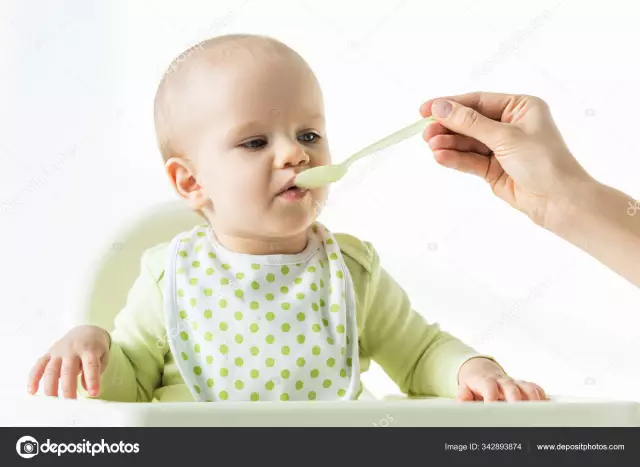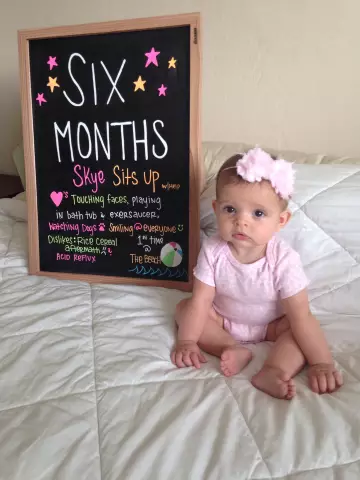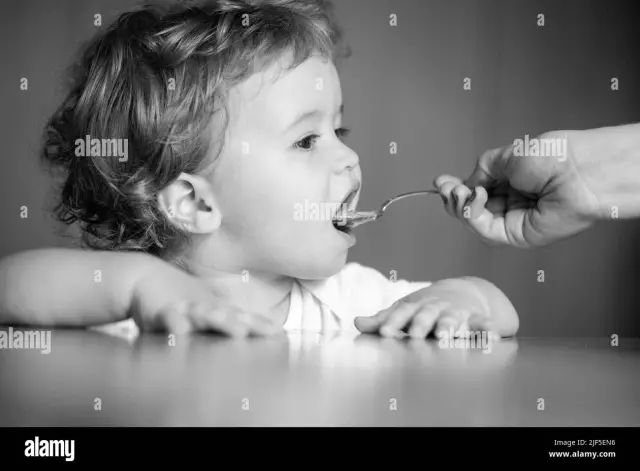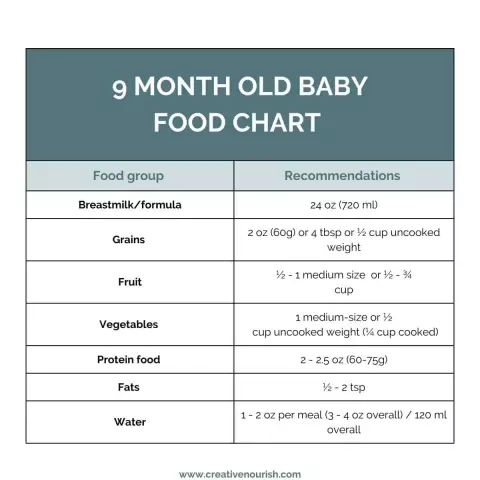- Author Rachel Wainwright wainwright@abchealthonline.com.
- Public 2023-12-15 07:39.
- Last modified 2025-11-02 20:14.
The baby cries while feeding - what to do
For a newborn, crying is the only available way to communicate with the outside world in the first months of life. There are several reasons why a baby cries when feeding:
-

The baby cries when feeding - the main reasons Physiological discomfort - various kinds of diseases, such as colic, thrush, stomatitis, otitis media, etc.;
- Physical discomfort - wet diapers, uncomfortable position, hypothermia or overheating, etc.;
- Psychological discomfort is the baby's need for frequent contact with the mother. Even when the baby is in her arms, but between feedings, the mother tries to take him as little as possible, he can cry to express his resentment and discontent even at the moment of contact with the mother.
A newborn baby cries during feeding: many parents face such a problem, and the main task is to determine the cause of such crying in order to eliminate it. By crying, the child says that he is feeling bad and needs help from adults.
Why does the baby cry when feeding
Let's try to consider in more detail why the baby cries during feeding:
- I have a stomachache. Infant colic is a common occurrence due to the immaturity of the intestinal microflora and the enzymatic system. The food in the baby's stomach is not digested enough, and in the process of fermentation of the remnants of undigested food, gases are formed, bloating occurs, and the baby is worried about colic, from which the baby cries when feeding. In this case, the child accompanies the crying with characteristic movements - he bends, pulls his knees to his stomach, twists his legs;
- An air bubble has formed in the stomach - when sucking, the child captures air with milk, the stomach swells unnecessarily, worries the baby, and he cries when feeding. You should hold it a little vertically, and the air will come out after a short time. The main reason for the swallowing of air by the baby during feeding may be improper grip of the nipple or nipple during sucking;
- Sore ears - the nasopharynx of babies in the first year of life is just forming, which is the cause of frequent otitis media, in most cases asymptomatic. But sharp swallowing movements with otitis media can cause acute pain in the ears. To check, it is enough to lightly press down the tragus on the baby's ears; if the child reacted with a sharp strong cry, it is necessary to urgently consult a doctor;
- Inflammatory processes of the oral mucosa - sore throat or mouth can be caused by thrush, stomatitis or pharyngitis;
- Milk tastes bad - Your baby may not like the taste of breast milk. This is due to the mother's diet, if she ate spicy foods, garlic or onions; the baby can take the breast, throw it and stretch again, and at the same time he cries loudly and resentfully when feeding;
- Lack of milk - feeling hungry with insufficient saturation during the sucking process can be the reason why the baby cries when feeding;
- Very fast milk release - when there is a lot of breast milk, it is difficult for the baby to have time to swallow it, so he begins to choke and cry;
- Fatigue. The process of feeding a baby is quite hard work, and his nervous system is hyperexcitable. If in the process of sucking he gets tired, then he reports it by crying. It is necessary to give the baby a rest and then continue feeding;
- Headache - There are a number of neurological disorders in newborns that cause headaches when the baby swallows. If each feeding of the baby is accompanied by his loud crying for no apparent reason, it is necessary to consult with a neurologist.
Why does the baby cry after feeding
If during feeding your baby felt comfortable, ate with appetite and did not show any signs of discontent, and cried immediately after eating, you should determine why the baby is crying after feeding. In this case, hunger may be the main reason for crying in a breastfed baby. Perhaps the mother's body does not produce enough breast milk, and the baby is simply malnourished. To check if this is so, control feeding is necessary, in which the baby is weighed before and after eating, the difference in weight is the amount of milk eaten.
If a bottle-fed baby cries after a feed, he may be overeating and should reduce the amount of formula. Since the amounts recommended by the instructions may not meet the needs of your baby for different ages, it is necessary to change the amount of the formula in each feeding and observe the baby's reaction.
In the first months after birth, the children's digestive system is just being formed, the muscular layer of the esophagus is poorly developed, the septum between the esophagus and the stomach is still absent. When air enters the stomach during sucking, the baby often spits up and may cry from abdominal discomfort. To avoid this, after feeding, you should hold the baby in an upright position for some time - this way the air will escape, and it will be possible to avoid regurgitation of food. And so that the baby does not swallow air together with milk, it is important to correctly apply it to the breast. The nipple must be inserted into the mouth as deeply as possible so that the baby's lips envelop the areola (areola). A sign of correct gripping of the nipple during feeding will be the absence of characteristic smacking sounds.
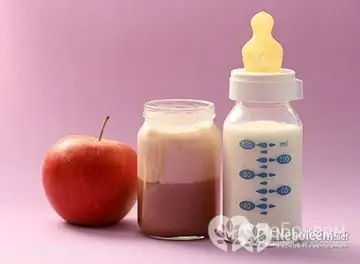
It should also not be forgotten that a baby who spent 9 months in the mother's womb, after birth, constantly needs contact with the mother. He needs to hear the usual beating of her heart, feel the familiar smell, hear his own voice. This is very important for the child, therefore, if he did not fall asleep immediately after feeding, then his crying may mean that he needs mother's affection, care and warmth. Lack of communication can have a detrimental effect on the intellectual and emotional development of the child, therefore, physical contact with a loving mother is necessary for the harmonious development of the baby. Calling crying of a baby is very easy to distinguish from crying due to pain or physical discomfort: as soon as the baby is in his arms, he immediately stops crying, but as soon as he is put back in the crib, crying resumes. It is imperative to satisfy such a need for communication, for him it is vital.
It is very important, if a child cries during or after feeding, to determine what exactly he wants to tell parents with his cry. And despite the fact that he can cry for many reasons, a loving mother will very quickly learn to understand why her baby is crying and will help him cope with any problems.
YouTube video related to the article:
Found a mistake in the text? Select it and press Ctrl + Enter.


